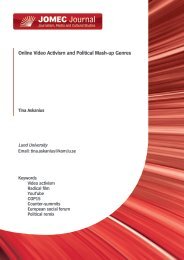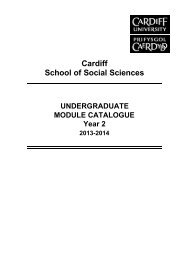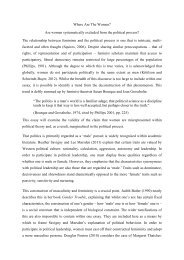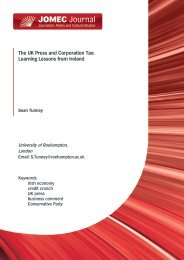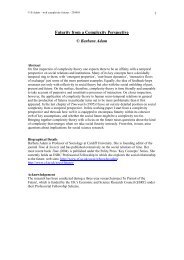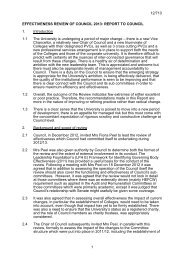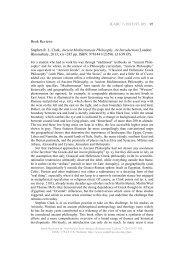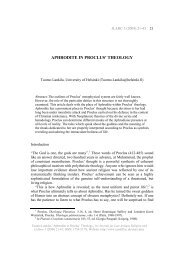Public Perceptions of Climate Change and ... - Cardiff University
Public Perceptions of Climate Change and ... - Cardiff University
Public Perceptions of Climate Change and ... - Cardiff University
Create successful ePaper yourself
Turn your PDF publications into a flip-book with our unique Google optimized e-Paper software.
Britain suggests that even environmentally concerned individuals are receptive to the<br />
reframing argument, if reluctantly so (Corner et al., 2011).<br />
Although it is recognised that the available data are not sufficient to determine the long-term<br />
impacts <strong>of</strong> Fukushima on public opinion in the two countries, it is clear that the British <strong>and</strong><br />
Japanese publics have responded very differently to the accident, just as their respective<br />
governments. Whereas British attitudes towards nuclear have remained remarkably stable<br />
over the years, <strong>and</strong> even appear to have s<strong>of</strong>tened somewhat in the wake <strong>of</strong> the accident,<br />
Japanese attitudes have changed dramatically. There is a clear need to establish the longterm<br />
impacts <strong>of</strong> the Fukushima accident. The collapse in public trust in the safety <strong>and</strong><br />
regulation <strong>of</strong> nuclear power may have far-reaching implications for Japan’s energy <strong>and</strong><br />
environmental policies. The demonstration in mid-2012 show the challenge Japanese<br />
authorities are facing to re-establish its nuclear energy generating capacity. The notion that<br />
trust is difficult to regain once it is lost (Slovic, 1993; Poortinga & Pidgeon, 2004) suggests<br />
that public opposition to nuclear power is likely to remain strong in Japan for some time to<br />
come.<br />
It is not clear as to why the Fukushima accident has not negatively impact upon public<br />
attitudes in Britain. It was expected that latent concerns about the risk <strong>of</strong> nuclear power<br />
would re-emerge in the case <strong>of</strong> a major accident (Pidgeon et al., 2008). However, these<br />
expectations did not materialise. A possible explanation is that some may think that the<br />
perceived causes <strong>of</strong> the accident (i.e. earthquake <strong>and</strong> tsunami) are not likely to occur in<br />
Britain (cf., Butler et al., 2011), while a lack <strong>of</strong> radiation-related fatalities may have convinced<br />
others that nuclear technology is safe (cf., Monbiot, 2011). This does however not take into<br />
account the loss <strong>of</strong> life as a direct result <strong>of</strong> the evacuation <strong>of</strong> vulnerable elderly patients<br />
(Tanigawa et al., 2012) <strong>and</strong> the conclusions <strong>of</strong> the independent Rebuild Japan <strong>and</strong> NAIIC<br />
investigations that Fukushima was a man-made disaster rather than a natural one<br />
(Funabashi & Kitazawa, 2012; NAIIC, 2012). There is a need to further explore the<br />
processes that underlie the apparent robustness <strong>of</strong> British attitudes in light <strong>of</strong> a major<br />
nuclear accident. Research conducted after the Chernobyl disaster suggests that the public<br />
use various ‘defensive attributions’ in order to make them feel safe (Eiser et al., 1989; Van<br />
der Pligt, 1993). Eiser <strong>and</strong> colleagues (1989) found that post-Chernobyl attitudes were<br />
closely related to alternative interpretations <strong>of</strong> the accident (i.e. if the cause <strong>of</strong> the accident<br />
was attributed to specific aspects <strong>of</strong> the reactor, modes <strong>of</strong> operation, or context OR nuclear<br />
technology in general). Similar processes may have contributed to the ‘rebound’ in public<br />
support for nuclear power in Britain (see Ipsos MORI, 2012). It is likely that the causes <strong>of</strong><br />
Fukushima have been attributed to specific conditions (i.e. earthquake <strong>and</strong> tsunami) that are<br />
not common to Britain, <strong>and</strong> that the conclusions <strong>of</strong> the independent investigations have not<br />
filtered through to the British public.<br />
Although different questions were used to assess public attitudes towards different forms <strong>of</strong><br />
electricity generation in Britain <strong>and</strong> Japan, the pattern <strong>of</strong> responses were remarkably similar.<br />
Overall, renewable sources were perceived most favourably; while fossil fuels <strong>and</strong> nuclear<br />
power were perceived least favourably. In Britain, favourability ratings <strong>of</strong> the different forms<br />
<strong>of</strong> electricity generation remained stable between 2005 <strong>and</strong> 2010. In Japan, however, the<br />
public were less likely to think that any specific energy source will contribute to a reliable <strong>and</strong><br />
20




